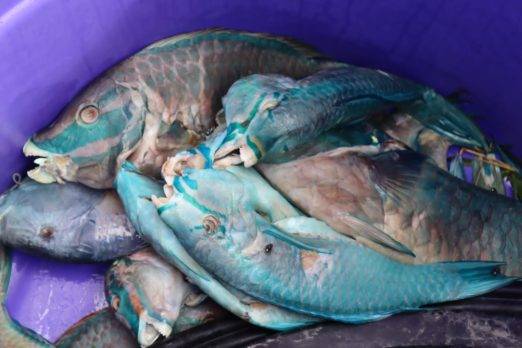Government makes simultaneous seizures of parrotfish in different provinces of the country

Santo Domingo. – The Ministry of Environment and Natural Resources, together with the Dominican Council of Fisheries and Aquaculture (Codopesca), the Navy of the Dominican Republic, and the assistance of the National Environmental Protection Service (Senpa), intervened simultaneously in five coastal provinces of the country, in which they seized large quantities of parrotfish, one of the species banned by decree 418-21.
The entity in charge of regulating the management, conservation, and sustainable use of coastal and marine resources pointed out that the execution responds to the directives given by Minister Miguel Ceara-Hatton, to comply with the provision of the Executive Power, which in its article 1 prohibits the capture, fishing, and commercialization of herbivorous reef fish families.

The operation, which was carried out in the provinces of Santo Domingo, San Pedro de Macorís, La Romana, La Altagracia, Samaná, and María Trinidad Sánchez, was headed by the vice-minister of Coastal and Marine Affairs, José Ramón Reyes, and the executive director of CODOPESCA, Carlos Then.
The species contained in the regulation are the Scaridae, which correspond to parrotfish, soapfish, butu, and parrotfish; the Acunthuridae called doctors and surgeons; the Pomacanthidae, which are angelfish; Chaetondontidae, the butterflies, and the Holothuroidea, called sea cucumbers and holothurias.
In this regard, the governing body of the environment stressed that it would continue its awareness programs through its Vice-Ministry of Coastal and Marine Resources and the Directorate of Education and Environmental Dissemination so that citizens know the importance of this species.
In addition, as part of the educational work on the matter, which will be done through talks, conferences, and the provision of information through different communication channels and, social networks, environment, together with CODOPESCA and the other institutions involved, added that it will continue to make approaches with fishermen and their respective associations at the national level, establishments and the general public who market such fish, also to curb their consumption in what is established in this fish community.
One of the main reasons why the entity seeks to comply with decree 418-21 is that coral reefs are among the most biodiverse tropical ecosystems in the world, built and maintained by living organisms very susceptible to overfishing, including herbivorous fish, such as parrots and doctors, which are critical to the preservation of this marine community.
Environment Ministry also said that it would continue to ensure faithful compliance with Law 64-00 on Environment and Natural Resources, which establishes the protection of biological diversity, so it has the power to establish closed seasons, set quotas for hunting and capture of wildlife species, as well as retain shipments of wildlife products, both originated and introduced into the country.
In this order, the agency recalled that article 149 of the law mentioned above gives it the power to determine the methods and practices of fishing, introduction, transplantation, cultivation and breeding, the places and dates, the species that may be captured, their size, sex and the number of specimens that may be captured.
About parrotfish

The parrotfish, which includes 95 species with common characteristics, is one of the primary organisms that provide white sand to the beaches of the Dominican Republic, which is why it has a high ecological value.
One of its best-known characteristics is that it is an eminently tropical species. In addition, it has a particular dentition, which serves to gnaw the coral reefs, thus doing a cleaning job against the algae contained in this marine community.


















Great news to know that the government is protecting coral reefs and species of fish. Garbage from rivers also damage reefs. This occurs because there is no monitoring of waste management. Accion ambiental Guayacanes AAG ( facebook ) launched a first ever public education campaign PLAYA LIMPIA explaining the impact of waste on our beaches and sea. The coral reef in Guayacanes needs protection also because it provides safe swimming areas.
Yes, it is good to know government is protecting. However, is it half hearted? The protection is weakened by a lack of resources needed to provide it. The needed resources include, boats & surface vehicles, increased vigilant staff, a reward system, educational programs, and of course money.